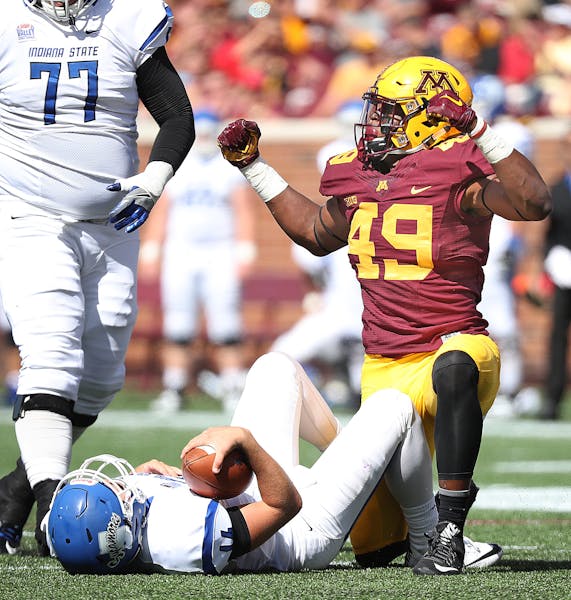As she approached the TCF Bank Stadium gates, Jennifer Marsnik was promptly turned away by security guards who deemed her small purse half an inch larger than new regulations allowed. She ditched the clutch and entered the stadium carrying tampons in her hand — as her ticket scanner gave her a dirty look.
Gophers fans have expressed exasperation over enhanced security at the University of Minnesota stadium, where a revised bag policy has sparked long lines and confusion since the home opener on Sept. 1. The new restrictions — implemented late last season following the Paris terrorist attacks — prohibit most backpacks, fanny packs, diaper bags, coolers and briefcases. Even umbrellas, seat backs and all but the smallest purses are also prohibited. It allows medically necessary items, clear plastic totes as big as a one-gallon freezer bag and clutch purses about the size of a hand.
Spectators have complained that the U didn't properly notify ticket holders ahead of time about what is considered contraband, which resulted in hundreds of fans being sent back to their cars to leave behind items that were once allowed inside and are still allowed at other venues, such as Target Field. But university officials say they made every effort to inform fans.
Backlash over the policies, which mirror those at Vikings and all other NFL games, is an inevitable growing pain, they said.
Debbie Madison and her friend were also denied entrance to a recent football game when security officers, measuring her bag with a 4.5-by-6.5-inch piece of paper, said it was just oversized. Unwilling to check their belongings at Williams Arena, the women simply gave their tickets away and headed for a drink down the block at Stub and Herbs.
"[We] decided to spend our money where it was appreciated and go back to our college bar for a good burger and watch the game there," said Madison, of St. Paul, a retired university employee of 35 years. She'd brought that same purse to Vikings, Twins and St. Paul Saints games in previous seasons.
Although waiting times of up to 25 minutes improved slightly between the first two games, officials hope to iron out more kinks before Saturday's third home game vs. the Colorado State Rams.
Gophers season-ticket holders were notified via e-mail about the new policy and the athletic department posted several reminders online, said Tom McGinnis, senior associate athletic director at the U.
They passed out fliers at parking ramps, raised billboards and recorded an audio clip to play outside the stadium in an effort to inform people. Visiting teams are provided information to distribute through their school's ticket office.
"It's a continual education process," McGinnis said. "We didn't expect it to be perfect the first time through, but we're obviously working to make sure we're communicating it more and improving our processes."
In addition to the revised bag policy, guests are also wanded on arrival. It is not yet a common NCAA practice, he said, but it is beginning to take hold.
Whelan Event Services, TCF's security service that previously provided security at Vikings games, first enforced those policies at the Metrodome in 2013, shortly after the Boston Marathon bombing. The NFL has adopted those restrictions in all of its stadiums.
Whelan signed a three-year contract with the U this summer when the previous vendor's contract expired.
The Iowa Hawkeyes have a similar bag policy but are more accommodating for parents, who are permitted to carry in diaper bags and a sealed water bottle. Border rival Wisconsin goes a step further, looking the other way on larger purses, binocular cases and chair backs.
The Minnesota Twins require fans to walk through a metal detector but have very few limits on what they can take in — as long as it's subject to search. Size restrictions on bags are much more lax, allowing purses nearly three times as large as the Gophers.
"Our crowds are a little more family-oriented, so that's where the flexibility comes from," said Matt Hoy, Twins senior vice president of operations. Their policies are largely a template followed by all 30 MLB teams.
Hoy does not anticipate any impending changes, since they began screening fans with metal detectors in 2014. Canine units also patrol the stadium every night.
Allan Falk, a Gophers season-ticket holder from Zumbrota, Minn., heard about the changes in an e-mail and planned accordingly: no extra stuff, just proper clothes and a blanket when temperatures dip.
"I have not had any problems at all," said Falk, 59, who has been attending games since the 1970s. "I guess for the most part it just takes a little common sense and preparation."
Still some fans questioned the need for the rules.
"I fail to see how asking people to put small purses in big clear bags makes people safer," said Ross Brendel, 29, who has been attending Gophers games for several years. Dozens wondered aloud why security officers couldn't simply take the time to check bags that were too big.
At a Beyoncé concert in May, women were dumping their bags instead of waiting in long lines to be told their bags were too big and had to be checked across the street at Williams Arena.
Gigi Berry, 30, of Minneapolis, called the security line a "nightmare." Berry, who was carrying medication from a recent surgery, said she had to point out her scars before a manager agreed to admit her with a purse. "I understand the reason behind bag checks," she said, "but being willing to accommodate your guests is important."
Liz Sawyer • 612-673-464

'He was about community': Scores memorialize north Minneapolis entrepreneur Sammy McDowell
Deadly shove at assisted-living center in Hugo investigated as homicide

Lack of volunteers forcing longtime Braille service to close
Two stalled Duluth housing projects move ahead

